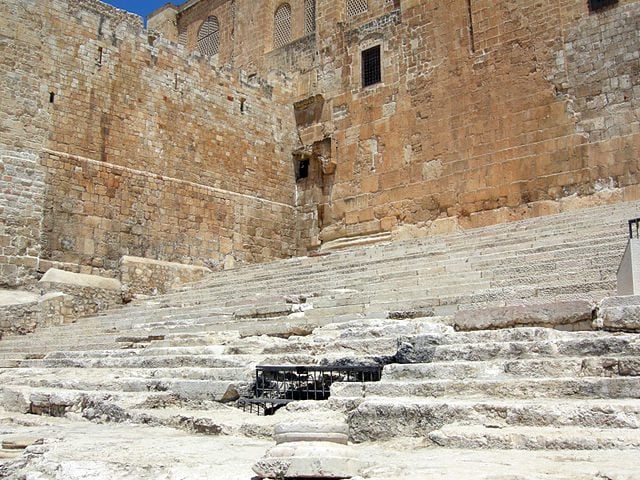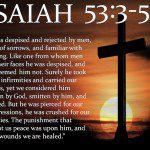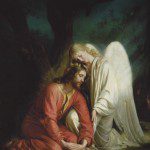. . . and Practiced by St. Paul, St. Peter, and St. John After the Death of Jesus

*****
Matthew 5:23-24 (RSV) So if you are offering your gift at the altar, and there remember that your brother has something against you,[24] leave your gift there before the altar and go; first be reconciled to your brother, and then come and offer your gift.
Matthew 8:4 And Jesus said to him, “See that you say nothing to any one; but go, show yourself to the priest, and offer the gift that Moses commanded, for a proof to the people.” (cf. Mk 1:44; Lk 5:14)Acts 2:46 And day by day, attending the temple together and breaking bread in their homes, they partook of food with glad and generous hearts,Acts 3:1 [right after the Day of Pentecost] Now Peter and John were going up to the temple at the hour of prayer, the ninth hour.[The notes in my RSV explain that the ninth hour was 3 PM “when sacrifice was offered with prayer (Ex 29.39; Lev. 6.20; Josephus, Ant. xiv.4.3).” ]Acts 21:17-26 When we had come to Jerusalem, the brethren received us gladly. [18] On the following day Paul went in with us to James; and all the elders were present. [19] After greeting them, he related one by one the things that God had done among the Gentiles through his ministry. [20] And when they heard it, they glorified God. And they said to him, “You see, brother, how many thousands there are among the Jews of those who have believed; they are all zealous for the law, [21] and they have been told about you that you teach all the Jews who are among the Gentiles to forsake Moses, telling them not to circumcise their children or observe the customs. [22] What then is to be done? They will certainly hear that you have come. [23] Do therefore what we tell you. We have four men who are under a vow; [24] take these men and purify yourself along with them and pay their expenses, so that they may shave their heads. Thus all will know that there is nothing in what they have been told about you but that you yourself live in observance of the law. [25] But as for the Gentiles who have believed, we have sent a letter with our judgment that they should abstain from what has been sacrificed to idols and from blood and from what is strangled and from unchastity.” [26] Then Paul took the men, and the next day he purified himself with them and went into the temple, to give notice when the days of purification would be fulfilled and the offering presented for every one of them.*Acts 24:11-12 As you may ascertain, it is not more than twelve days since I went up to worship at Jerusalem; [12] and they did not find me disputing with any one or stirring up a crowd, either in the temple or in the synagogues, or in the city.
21 St Paul’s Attitude to the Law — In view of the false accusations against him St Paul was bold indeed to come to Jerusalem. He had taught that the Law does not justify, which would eventually lead to its abandonment even by Jewish Christians. The Jews rightly concluded that he denied an absolute value to Circumcision, the Law and the temple, 28. On the other hand as long as Jewish Christians acknowledged that salvation came through faith in Christ, he had never forbidden them to observe the Law. It became for them something in the nature of a work of supererogation. The breach with the Synagogue was gradual. It is generally held that after A.D. 70 it was complete, and that then all participation in Jewish rites became unlawful. Thus when St Paul now acceded to the request of St James, he did not go against his principles. He was hardly the man to do that. He acknowledged a relative value in the Law, and he seems generally to have observed it himself; cf. 16:3; 18:18. He claimed to be a strict Pharisee, 23:6; 26:4–5. He protested that he had not offended in anything against the Law or the temple, in which he had come ‘to adore’, 24:11; 25:8; 28:17. These things were not incompatible with the preaching of the new faith. They prepared the way for it, and found in it their fulfilment, 24:14; 26:22–23, cf. Rom 9–11, 1 Cor 7:18–20.
22–26 The Nazirite Vow — 22. ‘What then is to be done? They will certainly hear that you have come’. St Paul must clear himself of the charges that are reported against him. 23. The four men had taken the Nazirite vow; see 18:18. They could not cut their hair until the period of their vow was over, and they had made their offering in the temple. 24. St Paul must pay the offerings of these four Jewish Christians, whose vow had still seven days to go, 27. He will thus sanctify himself by sharing in their vow, and it will be seen that he ‘walks in the observance of the Law’. St James meant St Paul to show that he observed the Law, and to refute the report about his attitude, which implied that he despised it. 25. He is reminded that his vow will not prejudice the case of the Gentile Christians, whose liberty the Apostles and presbyters had recognized at the Council of Jerusalem. Thus his action will not have the effect of that for which he blamed St Peter in the mixed church of Antioch, Gal 2:11 ff. 26. Being all things to all men, St Paul agrees, goes to the temple, and arranges for the day on which the sacrifice is to be offered. He seems to have had ample funds at his disposal at this period, Ramsay, St Paul the Traveller, 310 ff. ‘Being purified’: cf. Lev 15:13; ‘the days of purification’: cf. Num 6:5.
[S]trangely there is not a hint to be found anywhere of a dispute over the Temple and the necessity of its sacrifices, even though, according to the Acts of the Apostles, ‘a great many of the priests were obedient to the faith’ (6:7).
Paul himself, as far as we can tell, continued to observe the law throughout his life, especially in Jewish company, and his consent to take the advice of James on this occasion and share the purificatory ceremony of the four men who had taken a temporary Nazirite vow and pay their expenses was entirely in keeping with his settled principle: “To the Jews I became as a Jew, in order to win Jews” (1 Cor. 9:20).
My comment was and is temple worship became less important following the resurrection of Jesus.
For related reading, see my paper, Apostles and Synagogue and Temple Worship.













